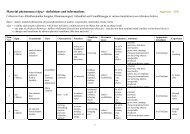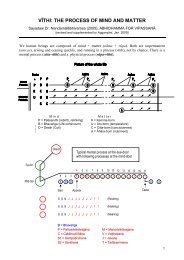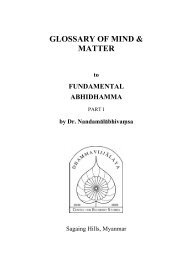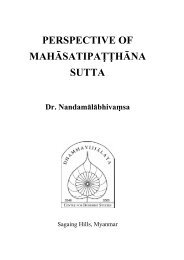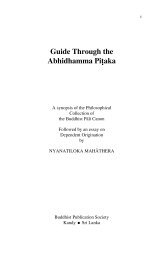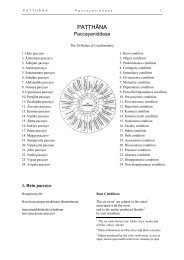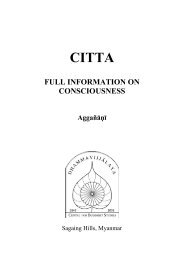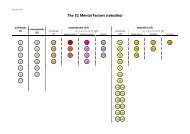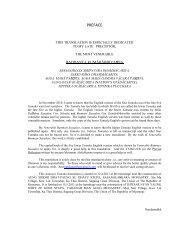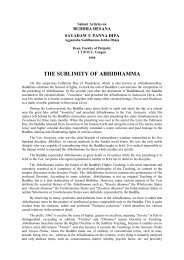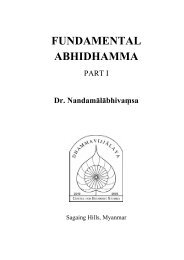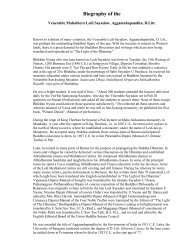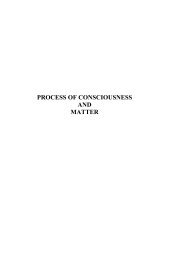ABHIDHAMMA IN DAILY LIFE - Abhidhamma.com
ABHIDHAMMA IN DAILY LIFE - Abhidhamma.com
ABHIDHAMMA IN DAILY LIFE - Abhidhamma.com
Create successful ePaper yourself
Turn your PDF publications into a flip-book with our unique Google optimized e-Paper software.
A good deed done with the sole hope to enjoy the luxuries of humans and Devas is an inferior<br />
wholesome Charity that will lengthen one is suffering in samsara.<br />
A good deed done with a view of attaining Nibbána is a superior wholesome charity will<br />
propel you to escape from samsara and assist you to attain your noble desire - Nibbána.<br />
6.5 How Charity Assists the Fulfillment of Perfection<br />
Generous donors are usually endowed with wealth in their future lives so that they can lead an<br />
easy life. The wealthy - who had done superior wholesome Charity in the past life - can observe<br />
precepts and keep uposatha Sabbath.<br />
The poor and needy, having to struggle for a living cannot observe precepts. In pursuing<br />
education too, the rich have the facilities.<br />
A wealthy person can easily practice the virtue of patience when he faces insolence or insult<br />
because he can ignore them with his own will power and self-esteem. However, a poor person, if<br />
he is insulted, is obsessed by the <strong>com</strong>plex that poverty invites injustice or insult and so he reacts<br />
vigorously. Since a rich person generally enjoys respect from various sectors he usually shows<br />
loving-kindness and <strong>com</strong>passion to them. A poor man is usually deprived of love and respect<br />
from others so he fosters anger or vain pride instead of loving-kindness and <strong>com</strong>passion.<br />
Therefore Charity (charity) helps the fulfillment of other parami perfections such as patience and<br />
loving-kindness..<br />
6.5.1 Those Who Can Do Without Charity - Charity<br />
The group of people who do not need to perform deeds of charity. They are the great yogis who<br />
strive earnestly to escape from samsara in the present existence. They are occupied full time in<br />
concentration (samatha) and Insight meditation (vipassana) work. If they spend their time in the<br />
performance of Charity, it will only be a waste of time and effort. Charity is not necessary for<br />
them as they are fully intent on gaining liberation very soon, they must zealously practice<br />
meditation day and night.<br />
Example: - Once a Bhikkhu from Mandalay who was always eager to perform charity came to<br />
practice meditation under the guidance of Maha Gandhron Sayadaw who was our Preceptor. One<br />
morning the Sayadaw saw the Bhikkhu gathering flowers to offer the Buddha. The Sayadaw<br />
admonished the Bhikkhu saying, 'While undertaking meditation practices, be intent only on your<br />
practice, you may offer flowers later on."<br />
The Maha Gandharon Sayadaw, himself was engaged day and night in the practice of meditation<br />
being fully resolved to liberate himself from samsara in this very existence. Whether he achieved<br />
his noble aim or not, I am not in a position to know. The Maha Gandharan Sayadaw spent all his<br />
time meditation alone in his cave. Yet he did not forget to give charity; once he came out from<br />
the cave he gave away the offertories in his possession to other Bhikkhus. Charity is unnecessary<br />
for a person engaged full-time in meditation. Of course charitable deeds can be done when there<br />
Page 52 A Gift of Dhamma Maung Paw, California



